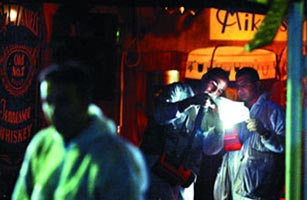
Israeli policemen search the scene of the Tel Aviv blast.
(2 of 2)
More puzzling than the logistics of the attack is what drove two well-educated young men raised in quiet English suburbs to suicide and carnage. The news of the crime certainly stunned the men's relatives and neighbors. Sharif, whose father was a successful Derby businessman, grew up in a comfortable house, and enjoyed football and skateboarding like any British teenager. He went to university in London but dropped out. When he returned to Derby he was married to a woman who always wore a burqa. He had become devout and exchanged his Western clothes for robes.
Asif Hanif's life had a similar arc. Polite and gentle, he was described by his brother, Taz, as "just a big teddy bear, that's what people said about him." Hanif was studying business at college, had worked part-time at Heathrow Airport and also reportedly grew more and more interested in religion. He eventually went to Damascus University in Syria to study Arabic with the aim of teaching it in London. Sharif, who reportedly left Derby before the Iraq war, also said he was going to Syria.
Somewhere along the way, the two men became radicalized, an experience shared by other British Muslims. The "shoe bomber" Richard Reid, jailed for life in the U.S. for trying to blow up an airliner in December 2001, changed from an amiable young man into an extremist, according to one London imam. Somewhere, too, middle-class Omar Saeed Sheikh was turned, and the clever London School of Economics student took jihad to the extreme. He was sentenced to death in Pakistan for the kidnapping and murder of American journalist Daniel Pearl. There are another nine Britons, captured during the Afghan fighting held in Camp X-Ray, and still others who died in Afghanistan without their parents in Britain even knowing they had joined the jihad. They too asked what had happened to their sons.
One answer seems to be preachers like fundamentalist Abu Qatada, whose sermons inspired the members of 9/11 hijacker Mohammad Atta's cell, and Jamaican-born cleric Abdullah al-Faisal, who urged his followers in Britain to kill non-believers with guns and even chemical weapons. Abu Hamza al-Masri's militant rhetoric at north London's Finsbury Park mosque apparently inspired many prominent terror suspects, from Richard Reid to Zacarias Moussaoui — and possibly Sharif, too.
Abu Qatada and al-Faisal are now in prison, and the government has initiated moves to remove Hamza's British passport. But Al-Muhajiroun, an extremist Muslim youth movement with offices in Derby and other cities, is still active. It has long been suspected of influencing young men to train for the jihad. According to its Syrian-born founder, Omar Bakri Muhammad, both Sharif and Hanif attended his Shar'ia law lectures though neither were members of the group. Its U.K. leader, Anjem Choudary, will not denounce the latest suicide bombing; he says jihad is a Muslim duty, Palestine a "Muslim land suffering atrocities" and "it's no surprise some should go there and fulfill their duty in this way."
Although the vast majority of British Muslims denounce terrorism, there are few who do not passionately support the Palestinian cause. Israeli Foreign Minister Silvan Shalom told TIME that he has warned British Foreign Secretary Jack Straw, "You have to act against those in Britain who encourage these people and incite them against Jews and against Israel." But to prevent more Britons from taking up the extremist calls to "fulfill their duty," the road map to peace in the Middle East must actually lead somewhere — and soon.